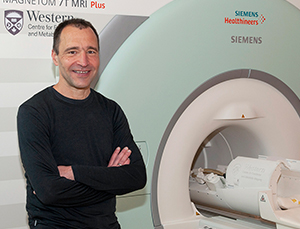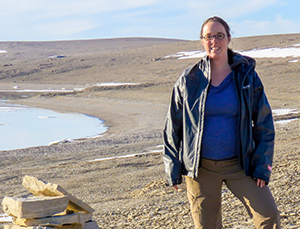Eighteen Western Science Researchers Successful in Obtaining an NSERC Discovery Grant
Announced on June 23, 2022, 16 Western Science researchers received an NSERC Discovery Grant and two received a Subatomic Physics Discovery Grant, spanning a wide range of topics and departments across the faculty.
The NSERC Discovery Grants support long-term programs of research in the natural sciences and engineering. They provide ‘grants in aid’ to support long-term operating costs and facilitate access to other funding, while enabling creativity and innovation supporting both fundamental and applied research programs.

Samantha Gateman
Samantha Gateman, the new Chair in Radiation-Induced Chemistry at Western and Assistant Professor in the Department of Chemistry, received her first Discovery Grant for her research into corrosion inhibition performance of advanced coating technologies using microelectrochemical methods. Her research aims to examine processes for coating materials that will inhibit or minimize the corrosion of products which are a part of our everyday lives. She also aims to improve the scanning electrochemical probe methods (SEPM) that allow the investigation of localized corrosion mechanisms and their evolution. For example, the SEPM methods utilized and developed in her laboratory will enable a deeper understanding of the corrosion mechanisms of metal thermal spray coatings used to protect industrial infrastructure and shed light on how to alter coating strategies for maximum corrosion inhibition.

Jörn Diedrichsen
Jörn Diedrichsen, Western Research Chair for Motor Control and Computational Neuroscience and Professor in the Departments of Computer Science and Statistical and Actuarial Sciences, received funding for his research using functional magnetic resonance imaging (fMRI) to build a new type of map of the human brain. Like trees in a forest, human brains vary in how they are arranged – no two trees have the same positioning of branches. To draw conclusions about the brain, this variability needs to be observed and included in models of the human brain. Diedrichsen and his team believe new models will allow them to better understand the brain. In future, these models may be applied to assist physicians in pre-surgical planning or spotting abnormal brain organization.

Catherine Neish
Catherine Neish, Associate Professor in the Department of Earth Sciences, received funding for her research that uses field work on Earth to learn more about geologic processes on planets and moons. When it is not feasible to send humans to the places in space that we want to study, we can observe similar environments on Earth which is simpler and more cost effective. Specifically, Neish and her team want to understand how impact melt is situated around fresh lunar craters on the moon; how impact craters are modified by erosion on Saturn’s moon Titan; and how lava flows are emplaced and weathered on Mars. Through her research, Neish will obtain valuable data that can be used to learn about the evolution of Earth and provide insight into how the planet will adapt to future geologic changes.
Check out all of the 2022 NSERC Discovery Grant winners in Western Science.
NSERC Discovery Grant
Michael Bauer
Cooperating autonomic agents for management of complex systems
Mark Biesinger
Advancing surface analysis techniques and methodologies for materials research
J Daniel Christensen
Homotopy theory, homotopy type theory and higher topos theory
John Corrigan
Molecules to nanomaterials: Tailored routes to clusters
Jörn Diedrichsen
A generative approach to human brain mapping
Roberta Flemming
Mineral structure and deformation as key recorders of earth and planetary processes
Samantha Gateman
Characterizing corrosion inhibition performance of advanced coating technologies using micro electrochemical methods
Hyukjun Gweon
Predictive analysis and quality assessment in statistical learning
Carol Jones
Evolution of circumstellar disks surrounding massive stars
Catherine Neish
Home from away: The Earth as an analogue for understanding planetary geologic processes
Anne Simon
Neurogenetic basis of social space determination
Gordon Sinnamon
Hardy and fourier inequalities
R Greg Thorn
Fungi of Carolinian Canada
Wenjun Yong
Experimental studies of physical properties in the Fe-Si-S System at planetary core P, T conditions
Ricardas Zitikis
Automated statistical techniques for systematic anomaly detection in high frequency data
Xingfu Zou
Study of some systems from of population dynamics and diseases transmission dynamics
NSERC Subatomic Physics Discovery Grant
Alex Buchel
Dynamical phenoma in Quantum Field Theory and String Theory
Christopher Charles
Production of radioactive molecules in radiofrequency quadrupole gas-cells

